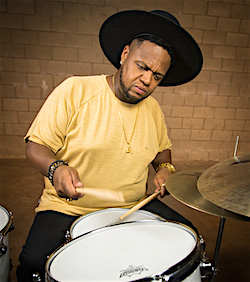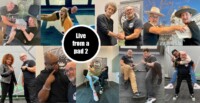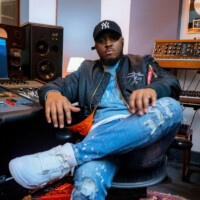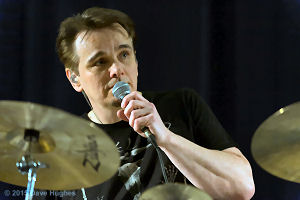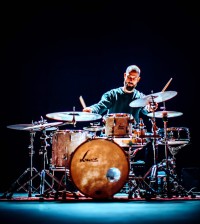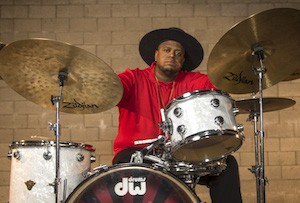 Stanley Randolph certainly holds one of the hottest seats in the business. Having the one and only Stevie Wonder choosing you to hold down the grooves for him is an honour in itself. Stanley had that pleasure at the humble age of 23 and has proven that he’s the perfect choice for the last 10 years now.
Stanley Randolph certainly holds one of the hottest seats in the business. Having the one and only Stevie Wonder choosing you to hold down the grooves for him is an honour in itself. Stanley had that pleasure at the humble age of 23 and has proven that he’s the perfect choice for the last 10 years now.
Aside from that he played the drums for artists like Christina Aguilera, Toni Braxton, Backstreet Boys, New Kids On The Block – to name a few – and produced artists like TLC, Fifth Harmony, Will I am and many more.
I met up with him after his show in London’s Hyde Park to chat about his musical upbringing, his move to LA, working with Stevie Wonder and his passion for producing.
Why drums?
I don’t know man. My mum said I just came out of her womb beating on everything.
I used to go to this church and I was just fascinated with the drums. I would go up to the drummer and just watch him the whole time. It’s crazy because no one in my family is musically inclined. Totally a gift.
I got my first drum kit, a silver sparkle Ludwig, when I was five years old, could barely sit down on the thing and just beat it to crap.
Did you have lessons growing up?
I remember I got some lessons from the drummer at church for about maybe a month, that’s all I did. After that I just played a lot. I think I really got more serious about drums as I got into middle school and high school. I got into marching band which is more military corps style where I learned all about rudiments and all that stuff.
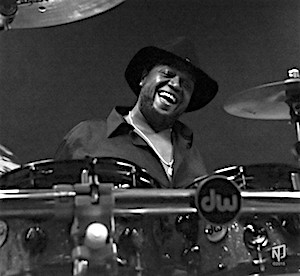 Those are great two influences: church for the feel and marching band for the technical side of things.
Those are great two influences: church for the feel and marching band for the technical side of things.
Exactly. Well, church does have a little bit of feel, it plays a part, but I would say the city that I’m from, Memphis, had more to do with my feel and vibe. Just growing up in that area. It plays a huge part now when I play with Stevie. The old school Soul comes out.
I guess coming from marching band you learned traditional grip, yet you play matched now.
Yes I did but it’s kind of over and done with. I haven’t used traditional grip in so long, man, but I was on it for about seven years. From middle school, sixth grade, all the way to being a senior in high school. It needs a lot of practise and I just haven’t, so I just lost the touch of it.
Who were your influences growing up as a drummer?
All the old school guys. I didn’t actually know a lot of the drummers who played on records that I grew up on. I just didn’t know who they were at the time. As I got older, before we had all this social media where you can access everybody, I used to go to drum stores and buy every video tape I could buy. I had the Dennis Chambers video tape, the Vinnie Colaiuta video tape, Dave Weckl, Steve Smith, Will Kennedy, Buddy Rich…. I watched a lot of drummers.
And then you actually stopped playing drums, is that right?
I did. Towards the end of high school I was at the stage where I wanted to make some money from playing drums but the place I was playing at at the time didn’t wanna pay. So I quit drums for a while and went to a friends church to play keyboards. I did that for about three or four years.
Your playing is some of the tastiest and ‘feeliest’ stuff I’ve ever heard. I’m curious where that comes from seeing as your main background is the marching band which is very strict and military.
That’s very true, there is not a lot of feel, just straight discipline. As far as where the feel for me has come from: first of all, moving to LA I met some very important people that I would consider as mentors;
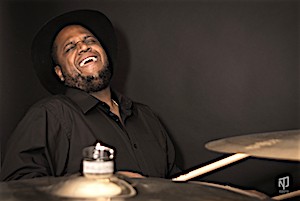 Rickey Minor – I did a lot of work with him and just seeing his camp and being a part of it, I learned a lot. It wasn’t about all the chops that I learned, it was such a professional level of playing that I had no choice but to change my feel and to adapt. Rickey had a big part…
Rickey Minor – I did a lot of work with him and just seeing his camp and being a part of it, I learned a lot. It wasn’t about all the chops that I learned, it was such a professional level of playing that I had no choice but to change my feel and to adapt. Rickey had a big part…
Rob Lewis too. He’s a huge producer and MD for a lot of people, we still work together a lot now.
Then of course Teddy Campbell, the drummer for Rickey Minor, who I would fill in for. Just knowing who he was and then actually meeting him and seeing him in his element once I moved to LA played a big part.
Also watching Nisan Stewart work. He’s another great drummer and huge producer in LA. Just seeing how he put things together, how everything is organised, how he performs, how he works with the artists and so on.
There are just so many people to name in LA. They have all done something for me and inspired me some type of way.
How came the decision to move to LA?
I was playing keys for a church back home and we came to LA to visit. I think I was about 20 or 21. We had just got there and wanted to get out to have some fun. We walked down 4th Street promenade in Santa Monica and hear loud music coming from this club called Harvelle’s. The guy at the door didn’t want to let us in at first because we were young and looked underaged so we tried to explain the whole situation: that it’s our first time here, we’re from Memphis, we just wanna see some different musicians and so on. We convinced him to let us look in and there was Victor Wooten, Gerry Brown, Ricky Lawson,…. there were so many great musicians in there. Oh my god. We grew up listening to these guys and now walk into a club two minutes away from our hotel and they’re all in one room…
We were just blown away. We started talking to them, Ricky Lawson convinced the bouncer to let us stay and after a while Victor and Ricky said: “You know what guys, if you have your instruments we’ll let you sit in.”. We literally ran to the hotel, got our stuff, came back and played The Chicken. At the time we were also a band called New Genesis (we actually still are) so we played some songs we had written ourselves. All the guys there really like what we did.
I’ll never forget the next day Ricky Lawson came and picked us up in his car and took us around all of LA. We went to this jazz club where we met lots of other musicians and actors. It was a crazy experience. All these people you see on TV and who do these amazing gigs playing for huge artists are right here in this city and you can go and talk to them. We even started getting offers to do gigs while we were there.
We went back home – man, terrible trip home, we just didn’t wanna leave. That all happened in August 2006. In October 2006 we went back to visit on our own. We were chilling at our rehearsal space and just decided to go to LA again. We literally went and got a rental car that day and drove non-stop. Everybody took shifts driving and we got from Memphis to LA in 24 hours. We just wanted to see if it’s really like that or if it was just a lucky moment. This time we stayed for two weeks and it was amazing. We did gigs, met more people, people started kind of knowing who we were, we even had to turn down gigs before we had to go back home. After making that second trip bro, for me it was just clear.
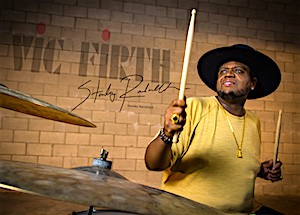 Your first pro gig in LA was Boyz II Men. How did that come about?
Your first pro gig in LA was Boyz II Men. How did that come about?
Yes, that’s right. I was playing for this Temptation singer called Ali Woodson at a little restaurant called Stevie’s Grill and this place just had a lot of heavy hitters and celebrities coming to eat there. This MD called Rick Saliss, who was the MD for Boyz II Men at the time, was there to have dinner and heard us play. He needed a bassist and a drummer for the band and asked me and my brother to play. My first time going to Russia and Canada was with the band. It was a pretty good experience.
You’ve also done the New Kids On The Block / Backstreet Boys double tour. That sounds fun.
Yeah, crazy story. The first week I moved to LA I was best friends with a drummer called Brian Frasier-Moore. I just dropped him a message to say that I’m new to LA and asked if he wanted to hang or had any advice. The best thing he’s ever done was allowing me and my whole band to come and sit in at the Christina Aguilera rehearsal. Rob Lewis was MDing the whole thing. I didn’t know anything about ProTools, in-ears and how the whole thing works, so it was amazing to get the chance to watch how the whole show and tour was put together from beginning to end. Not knowing that four years later I would get a phone call from Rob Lewis asking me to play for New Kids On The Block. Turns out the first tour was New Kids and Backstreet Boys together.
That tour went so well that Rob offered me some Christina Aguilera dates that Brian couldn’t do too.
Are you currently still working with Christina Aguilera?
Yes, I’ve actually been with her for the last five/six years. We’re currently working on a new TV show called Tracks which will be on Spike TV Network. Christina put the show together with her husband, we did the first two shows already recorded the first and the network loved it. We gonna start the show for good in September so people will see me on TV on a day to day basis. The whole point of the show is that you have to guess the song based of the part the musicians play. It’s set up quite nice and really focuses on the musicians.
Let’s talk Stevie.
Stevie!! Now for the way I got that gig I have to thank three people: Rickey Minor, Teddy Campbell and Chris Johnson. Chris had the gig at the time but he was having a child while Stevie was on tour so he wanted to leave and called Teddy to do it. Teddy was busy doing American Idol which had just come out, so he put my name forward. I get a phone call late at night: “Hey man, could you just come by the studio?”. I’m thinking Teddy Campbell is such a big drummer, maybe he wants me to check out some music he’s producing or something like that. I go to this studio which looks like an abandoned warehouse and while I’m sitting in the lobby waiting the doors open and Stevie Wonder walks past me. Now I didn’t know it was his studio so I’m thinking: Wow, if Stevie Wonder is here, I wonder who else is back there. So I keep chilling and then Teddy and Chris come out to the front and ask me if I could do some dates for Stevie. Chris explains that his wife is having a child and he needs somebody on backup. I just went: “Man, yeah!!”. I went to the back, in the live room of the studio, met Stevie, talked to him for a little while and then we played for two hours. We played Giant Steps, some of his stuff, basically we just jammed for two hours. Unbelievable! After that he just went: “You know what, you got the gig man, you’re cool.”
I was 23 or 24 at the time. I just couldn’t believe it!
It’s amazing! I’ve had the opportunity to work on a lot of albums with him, been in the studio numerous times to work on a lot of music. He’s taking me to a lot of places, man, I’m really grateful for that. I’ve been able to travel all over the globe and see a whole bunch of random cool places I would have never in a million years imagine I would end up in.
Working with him is awesome. He’s always creating new music and he keeps you on your toes for sure because he’s the type of guy who would never do the same thing more than two times, he likes to keep things fresh.
How does it feel playing his parts? After all he recorded most of the drums on his albums himself…
It’s fun. The last three years it’s actually been even more fun because I studied his music more. When I first got the gig they gave me this iPod with pretty much all of his music, something over 300 songs, and I had to learn as much as I could. Since then I kind of chilled out on learning his music because the gig became a little bit more free and I could be myself a bit more; but when we started doing this ‘The Songs In The Key Of Life – Tour’ Greg Phillinganes came onboard to MD the gig for a short time. While he was there he said he really wanted musicians to respect the authenticity of the music and genre from at that time because it just had a certain feeling and vibe. He wanted to recreate that certain energy the music put out back then on this tour, so it made me go back all over again to study the music and really pay attention to how Stevie played the record. As I was doing it I remembered that Stevie came to show me parts on the drums all the time. I remembered how he played them and how he looked when he played them.
Plus, I’ve been in his studio so many times, so I’ve seen the drums that he used to record these albums, which is just crazy. There is nothin like hearing a record or a hit song on the radio and then going to the place where it was created. You hear the drums on the record and you’re just blown away by the sound and wonder how they did it – then you go to the studio, you see those drums, you sit down to play them and they’re they exact tone and sound from what you heard on the record. You know what I’m saying? Before all the ProTools shit. It’s unbelievable.
So yeah, I saw how he set up his drums: no bottom heads, his snare drum head has never really been changed and has lots of old tissue and tape on it to make it sound dead and funky. When Greg said he wanted to make it authentic I just took all the things I learned from Stevie in the studio to create this vibe from the 70s and 80s but with a new approach of being a younger guy. Making it authentic but still being myself.
How does the Stevie gig compare to your other more ‘poppy’ work? You once said Stevie doesn’t rehearse much, I’m guessing there are not click tracks…?
Actually the whole show is clicked out. The reasons is we actually took a lot of original information from album, from the session back then. Certain parts for example can’t be replayed because he used a certain instrument that you don’t want to travel with. He had that big dream machine which is just impossible to tour with.
Also just some nuances and certain parts of the record that you just can’t recreate.
So yeah, the whole show is to track but you wouldn’t think so because there are so many people up there who all play live.
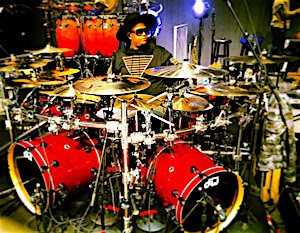 How do you feel about click tracks?
How do you feel about click tracks?
I love them, it’s the best thing ever. It just keeps everybody on the same page. I’ve been on gigs without click on a huge stage and it’s easy for people to get lost.
I also played in bands where you have that one musician where the adrenaline gets the best of them and they’ll speed up, but with a click track everybody just knows where to stay.
You’ve got Fausto Cuevas joining the rhythm section on percussion on that gig as well.
Yes, I love it. Fausto has taught me a lot. He’s from the Latin world, he grew up in it and it’s a very different place. You think you know Latin music when you’re growing up as a drummer – it’s just the same beat that everybody plays – but being with him and studying a bunch of different music and cultures totally opened up my mind. It has a part to play in all of my playing. I learned two things from Brian Frasier-Moore and from Fausto in Latin music: the importance of accents. Sometimes knowing the melody and the lyrics is key because as a drummer you don’t really have to do a lot of chops, sometimes you can just do the coolest, simplest fill based of the melody or the lyric and make it seem like something amazing and meaningful. Rather than going crazy playing for yourself you’re playing with everybody and for the music because you’re in sync.
I learned that from both of those guys.
You produce a lot as well, right?
Yes, I’m currently signed to Sony RedZone, Tricky Stewart. I think that’s my third or fourth year with them now.
I’ve always been into making tracks. Even at a younger tracks I recreating tracks I liked. I would go home, had my MPC, my laptop, I had Reason, I would borrow my friends keyboard and just sit there and remake beats and songs that were already out. I just had a fascination doing it.
This guy in my apartment building always saw me loading my drums and one day he came up and went: “Yo bro, I see you’re a musician, do you make tracks and produce? I just got this new studio and was wondering if you wanted to become the house producer?” I go to the studio to check it out and it was just awesome. That studio became my home for like three years. Being there I taught myself ProTools, had to learn the whole microphone set up, different mics, pre-amps, plugins…all of it bro, and I’m still to this day just overwhelmed by it and still learning more and more. That’s the next phase as far as my whole career goes because drumming is my first love, it’s the thing I do all the time I’ve done a lot in my drumming career and I’m gonna do way more, but I’m just picking up more on the producer side. I’ve been producing a lot of new records and all that stuff is gonna drop soon.
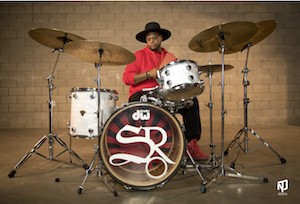 I was about to ask about the next step in your career. It’s pretty hard to top Stevie Wonder.
I was about to ask about the next step in your career. It’s pretty hard to top Stevie Wonder.
Yes, that’s exactly what I’m working on now. Right now Stevie is amazing. I get to work with a lot of great people, great friends and great artists but when he goes on to the next life or whatever, I already wanna be set up doing my whole production thing. I don’t want there to be a pause where people are wondering about what Stanley’s gonna do. I let people know what I’m doing now already and it’s actually working. I promote on social media all the time that I’m working on different records, I have placements right now, I’ve got a song with Sierra, 2 Chainz, done some music with Will I am – I’ve been in the game. I’m gonna be in that lane for sure. I’ll still be a drummer but I thought why not produce some records with some new artists, out them out, promote them and what not. You can play drums on your own, travel on your own, just do your own thing. I’ve been touring for the last ten years non-stop so I’ve seen how it runs, made a lot of great connections and a lot of great friends. Now it’s all about using my resources and making the next step.
Finally, what’s next?
I’m going back to LA now, straight to the studio to work on some producing, but I also have lots of Stevie dates coming up. One-off’s for now but he’s starting a tour end of August/beginning of September.
I have some more Christina dates, more Toni Braxton dates and then I’m starting the game show with Christina. The rest of the year is book pretty solid.
Thanks you Stanley for your time and thanks to Gary from GAM Representation for hooking it all up.
Interview by Tobias Miorin
August 2016

